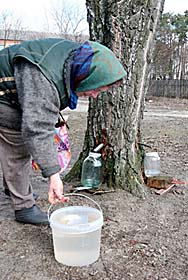
Spring has sprung and it is time for birch juice! Birch sap flows in the early spring when the nights are cold but the days are warm, usually March and April in Ukraine. Birch juice tastes mostly like water with barely perceptible sweet, woody notes. As a food source, it is rich in vitamin C, sodium, potassium, manganese and calcium. As both Ukrainian foresters and grannies will attest, birch juice has medicinal properties and is a salubrious beverage. It is touted as an antioxidant that particularly supports the liver and kidneys. Unlike North American maple sap, in Ukraine, birch sap is typically drunk in its unadulterated form, rather than boiled into a thick, sweet syrup. (I have never seen birch syrup in Ukraine but, apparently, it is made. However, it is rather resource and time intensive. According to University of New Hampshire Cooperative Extension, the ratio of raw birch sap to syrup is 100 to 1. By comparison, 40 liters of raw maple sap are required for 1 liter of maple syrup. Despite this, birch syrup is allegedly an emerging cottage industry in Alaska.)
Many rural Ukrainian households collect and preserve birch juice for personal consumption. However, in Ukraine, the State Forestry Enterprises tend to be the largest collectors and have developed commercial operations. Several species of birch (Betula) may be tapped for juice. This involves driving a hole into the truck of the tree. As the temperature rises, the clear liquid sap flows from the hole and into waiting buckets. After collection, the juice is usually strained and enjoyed. However, birch sap is highly perishable and must be pasteurized and preserved almost immediately. Some folks prefer a little sugar or honey in their birch juice while others like it pure. I have also heard of birch wine and birch-vodka cocktails, although I have not yet had the pleasure!
If you have stories or photos related to tapping birch, preserving sap, the therapeutic wonders of birch juice or serving suggestions, please share. We would love to hear from you!
For information about tapping birch trees and making syrup, in English, see the University of New Hampshire Cooperative Extension’s site.
